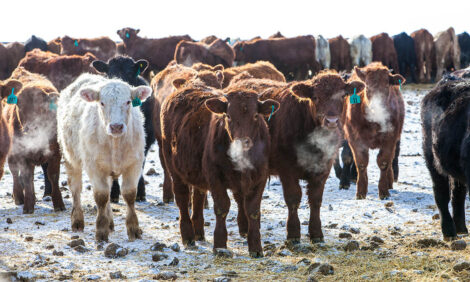



AgriLive: The Red Meat Debate
Climate change dominated a debate led by a panel of red meat industry experts at AgriLive in the UK, as issues such as declining livestock numbers, cheaper imports and profitability were pushed aside, reports TheCattleSite junior editor, Charlotte Johnston.On the panel were Member of European Parliament - Richard Ashworth, Professor of Food Marketing - David Hughes, British Meat Producers Association - Phil Handling and Chairman of National Farmers' Union livestock board, Alistair Mackintosh. The meeting was chaired by Stuart Thomson, English Food and Farming Partnership.
Mr Ashworth summed up food security as one opportunity and three threats. He said that the ever increasing world population represented a huge opportunity for the agricultural industry. However threats included climate change, price volatility and EU budgets.
The reform of the CAP post 2013 is worrying for producers, with the Lisbon Treaty agreed on 1 December 2009, all decisions on agriculture will be made by Parliament, not as they were previously by the Council. He believes that this will have a huge impact on the EU budget, as climate change, energy security and migration controls are topics are of particular importance. He stressed that it was the government's responsibility to ensure food security by working with producers.
A member of the audience angrily pointed out that the UK would not be represented at a meeting concerning the CAP reform this week in France. Mr Mackintosh said that the elected representatives had a responsibility to ensure that UK issues were understood and represented at international meetings. He urged them to up their game.
With regard to food security, David Hughes said that without demand for red meat, there is no industry. "Consumption demand is driven by income and population growth."
With the current economic climate, he expects the demand for beef and lamb to stay stagnant for the next 10-15 years due to health, environmental and social concerns.
Mr Hughes said that internationally profits from red meat production needed to improve, he said that even major processors were suffering. "It is not a simple case of relocating profits, you need to convince the consumer that they should pay more for red meat because of things like taste, tenderness, quality."
Climate changed sparked a passionate debate between the panel and the audience. "Farming is seen as part of the problem, but we're really only second players," said Mr Ashworth, referring to energy use, modern transportation and household waste.
He said that it was vital the industry strove to declare itself carbon neutral as soon as possible, and that more research and development was needed.
Mr Ashworth said that it was grossly misleading of people like Paul McCartney to encourage society to give up meat, and encouraged the industry to fight back.
Mr Mackintosh said is was not a case of meat eaters versus vegetarians. He sees tremendous opportunities in the future. He said that grass was a sustainable source of food and the best way to convert it to energy was through livestock/ red meat production.
He said targeting red meat consumption and the natural environment was a soft option, as other issues such as plastic were more complicated to solve.
A member of the audience agreed that the industry had been a soft option and that is was time the industry fought back aggressively. "What are the alternatives to eating red meat?" he asked. "If your going to get 60 million people eating a vegetarian diet, those people will certainly produce more emissions than what are produced now."
With discussions in Copenhagen this week, it is expected that livestock producers will be asked to conform to further standards concerning sustainable production. Mr Ashworth said that this presented an opportunity for the sector. "Producers in Europe already perform to the highest standards with regard to environment and welfare. Upping these standards will allow us to say to countries such as Brazil - no we will not import your meat because you do not conform to the carbon neutral standards/ quality assurance that our producers do."
Mr Hambling said that consistency was the 'holy grail' for consumers. He felt that currently sustainability was a bigger issue than quality standards.
Mr Ashworth concluded saying that everything presents an opportunity, for example BSE resulted in higher traceability, an opportunity which he says was lost by the industry to the retailers, who benefitted from added value. "Climate change is a major opportunity - do not let the retailers take this from you. Acting now will ensure added value to the red meat industry."
December 2009


